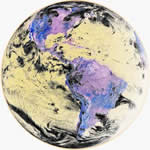Friendship in Hanoi
By Elizabeth Jaeger
Photos by Elizabeth Jaeger
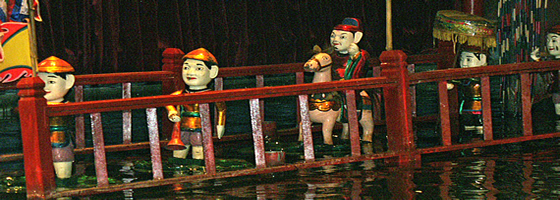
Humidity – thick and sticky like chewed caramel — enveloped me as I stepped off the bus. Summer in Southeast Asia was always unmercifully hot. Murky gray clouds covered the sky and deep puddles dotted the streets of Hanoi. Luckily a light breeze offset the humidity ensuring that I would be able to breathe.
By the time I checked into a hotel and dropped off my rucksack, dusk had settled over the city. It was too dark to do much exploring, but since I was hungry, I decided to search for somewhere to eat. After a short walk, I found myself in the Old Quarter, a quaint area of the city that draws lots of tourists. The streets were narrow and crowded with restaurants, tourist agencies, homes and shops selling everything from trinkets to clothes. Although the buildings were often run down, their colors and architecture echoed Viet Nam’s colonial past.
In the thirteenth century, there were 36 guilds in Hanoi and each street was named after the merchandise sold there. Many of these names are still in use today. I tried to picture my surroundings as they might have looked all those centuries ago, but the chaos that surrounded me made it virtually impossible. Revving engines and honking horns, belonging to cars and motorcycles, kept me alert. Drivers paid little attention to pedestrians. Cars would careen around corners and neglect to stop at crosswalks.
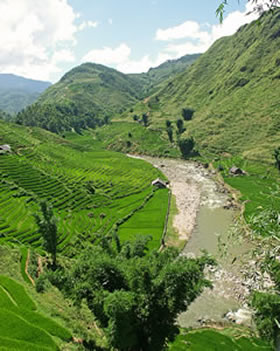
At first I walked randomly, not caring where I ended up. But when my stomach growled for the second time, I thought it best to select a specific destination. Consulting my map, I realized that I was on Pho Hang Bac (Silversmiths Street). From there I turned left onto Pho Ma May (Rattan Street) which brought me to the Tamarind Café. I opened the door planning on getting something quick to eat, but when I stepped inside, I took a detour to Handspan Adventure Travel – a kiosk within the cafe. While in the north of Vietnam, my main two objectives were to go trekking in Sapa and to go kayaking in Holang Bay. I had no intention of booking any tours that night, but since I was there, I figured it couldn’t hurt to inquire about prices.
I reached for a pamphlet with a picture of Holang Bay on the cover, but before I opened it, a woman’s voice — speaking English with a northwestern American accent — distracted me. Curiously, I searched for a body to match the voice. I found her, standing six feet away talking with two German tourists. It appeared as if she was trying hard to convince the Germans to go with her to Sapa, piquing my interest.
“So, you want to go to trekking?” I slithered into the space between her and one of the Germans.
“Hi!” Her eyes swiveled towards me. “I’m going to Halong Bay and then hopefully Sapa, but right now I’m by myself. If there was at least one other person it would cut the cost substantially.” Her perky personality was infectious, the type of person who drew you in and made you want to be her friend.
“When are you going?” I had no set schedule. I could easily adapt myself to her plans.
“I’m leaving for Halong Bay tomorrow.” The excitement in her voice mirrored my own.
I had wanted to go to Sapa first, but the order was irrelevant, especially if given the opportunity to go with someone. “That works for me.” I agreed, completely ignoring my intention of not committing myself to anything that evening.
“By the way, I’m Bonnie,” she introduced herself almost as an afterthought, a common occurrence amongst backpackers.
“I’m Lizzie.” I shook her hand. And in that moment, we committed ourselves to a week of traveling together.
Since we knew exactly what we wanted to do, booking the two trips was quick and easy. Once we paid and secured our receipts in our money belts, Bonnie asked me if I cared to join her for dinner.
I chuckled, “I suppose having agreed to spending the next eight days with a stranger, it would be good to find out if we’re compatible.”
“And if we’re not?”
“Let’s hope we are.”
We found a small restaurant only a couple of blocks a way. Bonnie sat down at a table near the window and I sat across from her. From a back room, a young man emerged carrying two cups of tea and a menu for us to share.
“Would you be up for sharing two dishes?” Bonnie asked.
“Sure, but I don’t eat meat.”
“Neither do I,” she smiled. We had passed the first test of our compatibility. “How about this?” she pointed to noodle dish.
“Looks good. And for some variety, would you be up for fried tofu and vegetables?”
“Absolutely.”
While we ate, we talked about everything – our travels, our dreams and our jobs. Instead, of someone I just met, I felt as though I were talking to an old friend, someone I had known for years. It was only when a yawn escaped my mouth that I realize how late it had gotten.
Rain slashing against the hotel window woke me up. It was a typical monsoon storm, torrential at the start, but by the time I took a shower and got dressed, the rain had dwindled to a drizzle. I walked to Handspan and when I pulled open the door I found Bonnie sitting at a table with a young, recently married American couple. In total, ten people were heading to Halong Bay and I was surprised to discover that nearly all of us came from the States.
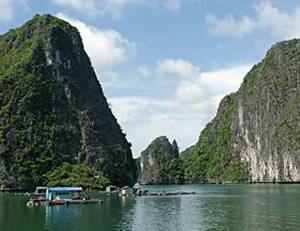
The drive was long, but the time passed quickly in conversation. I had seen many pictures of the bay, but none completely captured the beauty that awaited me. Rock islands jutted up out of the deep green water. The sun, struggling against the clouds, glinted off the dwarf swells that gently rocked the larger tourist boats in the distance. Floating docks and small vibrantly colored wooden fishing boats dotted the waters. Dwellings, loosely constructed by locals, sat on the docks. Intrigued, I listened as our guide explained that the boats doubled as houses, homes for families that lived off the bounty of the bay.
Eagerly, we boarded a traditional wooden junk boat and our guide showed us to our cabins. Bonnie and I followed him downstairs and into a relatively spacious room, with crisp white sheets covering two single beds. Stretching out on the mattress, I was surprised to find that it was firm.
“Sleepy?” Bonnie asked.
I nodded but sat up. We had five minutes to make our way back upstairs. The first event on our itinerary was a kayaking excursion that I was loath to miss. With one exception, all the kayaks sat two people. I wanted to go out on the water alone, but Bonnie leaned in close to the one—man boat and by the glimmer in her eyes, I could see that she wanted it as badly as I did. Unwilling to put a strain on our fledgling friendship, I reluctantly paired up with a woman from Australia.
In a messy line, we followed our guide into several caves of varying sizes. Perched in a smaller vessel, Bonnie was able to penetrate the caves more deeply, and not having to comprise with anyone, she was free to explore more thoroughly. Jealousy pricked at my heart, but I tried to focus instead on the serenity of the moment and my contentment to be drifting lazily on foreign waters.
Later that afternoon, we ate lunch on the deck of the junk boat. The sun was high and without clouds to shelter us, the heat baked our bodies. I slathered on sunscreen to protect my skin but that did nothing to cool me off. Then suddenly, I heard a splash and bolted out of my seat. Rushing over to the side railing, I saw one of our companions treading water. She had jumped off the side of the boat. A brilliant idea! Lining up, we each took a turn. Falling from such a height, the adrenaline rush felt like a punch in the stomach, but the warm water that cooled my body made it worth it.
As always when traveling, time passed too swiftly and our cruise seemed to end before it even began. While we sat on the deck waiting to disembark, we passed around notebooks, journals and scraps of paper, requesting addresses so that we could all keep in touch. I had played this game before, dozens of times on previous holidays. Except in extremely rare cases, no one ever followed through on a pledge to keep in touch. Why people persisted in a ritual driven by broken promises I had no idea? But I participated, simply because it was the thing to do.
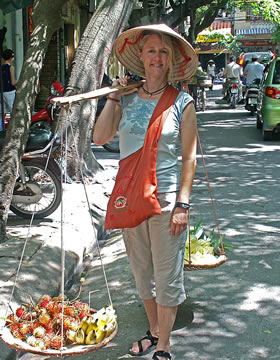
When we returned to Hanoi, Bonnie and I spilt the cost of a hotel room. We had a couple of days to sight see before heading to Sapa. A visit to Hoa Lo Prison, better known to some Americans as the “Hanoi Hilton,” topped both of our must—see lists. It was where many American POWs were incarcerated during the American War (known to us as the Viet Name War). Amongst the war relics in the museum was the uniform worn by the now senator of Arizona – John McCain. It appeared to be a source of pride for at least one Vietnamese man. Giving a tour of the prison to a group of Japanese tourists, he stopped beside the case that displayed McCain’s uniform. “Belonged to McCain,” he pointed, his finger reverently touching the glass. “He very high up in American government. Very important, very very important man.”
That night we went to see a water puppet show. Initially, I wasn’t terribly enthusiastic about going. Puppet shows had always bored me, but Bonnie was excited about seeing the show, and since I didn’t have anything better to do I joined her. Besides, water puppet shows are an integral part of Vietnamese culture. I’d have been foolish to miss it. During the show, the puppeteers stood in water behind a curtain. Puppets were attached to long sticks which the puppeteers skillfully guided through the water. The scenes reflected Vietnamese folk lore and were accompanied by traditional music. Despite my initial disinterest, I enjoyed myself immensely.
The following day, Bonnie and I took an overnight train to Sapa. Lan, the woman who would be our guide for the next three days, met us at the station early in the morning. She spoke English surprisingly very well and she was eager to share her knowledge of the region.
The trek was not difficult; the landscape was serene and pastoral. Mountains covered in thick vegetation – the dark green leaves of the tress complimenting the light green grass — surrounded us. We walked beside rice paddies, crossed rocky streams and occasionally passed simplistic single story wooden houses constructed by locals. Along the way we encountered several Black H’mong people, many of whom were camera shy. They were dressed in traditional H’mong indigo hemp robes. On their backs they carried baskets filled with handicrafts to sell to tourists. Bonnie made a few purchases for her nieces back home, but I didn’t buy anything. As a token of friendship and kindness, each of the women tied a colorful string bracelet on our wrists.
The children who lived in the hills were exploding with curiosity. Oftentimes, tourists are their only link to the outside world. Many of them live without technology so our digital cameras intrigued them. Bonnie and I took turns snapping their pictures and, when we showed them their portraits on the tiny screen, they squealed with delight.
Our second day in the mountains we went swimming in a river. A young girl led us through the small village in which we were staying. Engaged in conversation, neither Bonnie nor I paid much attention to where we were going. We didn’t realize that once the girl delivered us to the swimming hole she would return home, leaving us alone to find our own way back. As dusk approached, we dried off, not wanting to have to pick our way back through the dark. Both Bonnie and I thought that if we walked in a straight line we would find our home—stay. We remembered incorrectly. Walking in circles we tried desperately to communicate with the locals. But we didn’t speak their language and they didn’t speak ours. Despite their inability to help us, they were incredibly patient and friendly. Two families invited us into their homes, offering us shelter for the night. When we shook our heads they looked perplexed, not understanding that we already had somewhere to stay. Eventually, after many wrong turns, and long after the sun had set, we stumbled upon the correct house. Luckily, we arrived just in time for dinner.
Around noon of our third day in Sapa, our trek came to end. It was still early enough that we had a few hours to relax before having to catch the train back to Hanoi. Leisurely, we strolled through the outdoor market, buying souvenirs for those we left behind in the States. The sky was blue, the sun bright, but as we exited the market, heavy dark clouds swept across sky. Within minutes, rain descended in a fury.
To escape the weather, Bonnie and I ducked into a café for a drink. We were the only customers, and even though we only ordered tea, they were happy to have us – tourists – sitting there. The owner of the café smiled at us with a crooked smile, his yellow teeth looking green in the dim light. “Do you like music?” He asked. We nodded and he enthusiastically popped a tape into his VCR. Within seconds, George Michael’s voice, belting out the lyrics of “Last Christmas,” filled the café. I laughed and tea sputtered out my nose. It was late July, five months before Christmas.
But Christmas music must have been the only English music available in the café and the look of pride stitched across the owner’s face indicated that he was pleased to have something to offer us in our native tongue. The music videos that followed George Michael showed Vietnamese men and women dressed up in Christmas attire singing traditional Christmas carols. When our laughter finally subsided, somewhere around the third song, the holiday spirit overcame the both of us. We could no longer resist the urge to sing along.
Eventually, the rain stopped. We paid for our tea, left an outrageously generous tip and danced back outside, still singing. Walking through town, Bonnie shook hands with strangers and wished them all a Merry Christmas. I don’t know if they understood her, but it didn’t matter if they did. As we waltzed away, skipping through the puddles and cha—cha—ing through the mud, I watched as their solemn faces brightened and their lips twitched in a subtle smile.
For Bonnie and I, it would never again matter what season we were in. For the both of us – whenever we chatted or saw each other — it would always be Christmas.
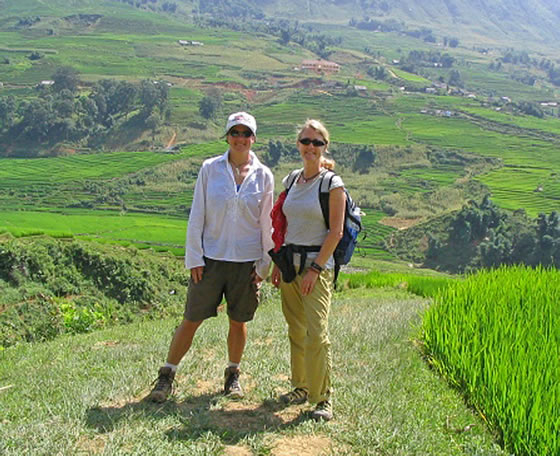
About the author

Elizabeth Jaeger is currently finishing up an MFA degree in creative writing at Fairleigh Dickinson University. She is an assistant editor at The Literary Review, and her work has been published in Literary Explorer, Atticus Review, and Linden Avenue Literary Journal. A recent essay of hers was featured on the podcast No You Tell It.
Did you like the article? Subscribe here to our New Article Email Alert or RSS feeds.
Sharing is caring! Don't forget to share the love, and keep the conversation going by leaving a comment below:
Advertisement
